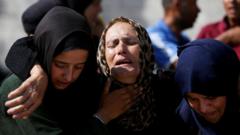Iran's engagement with BRICS coincides with its efforts to counteract military threats from Israel and the U.S.
Iran Seeks Support from BRICS Amid Rising Tensions

Iran Seeks Support from BRICS Amid Rising Tensions
As the Islamic Republic faces isolation in the Middle East, it looks to BRICS for solidarity against Western powers.
In a world unsettled by geopolitical tensions, Iran is seizing an opportunity to strengthen its global alliances. From July 5, 2025, Iran will participate in a two-day BRICS summit in Rio de Janeiro, joining the ranks of Brazil, Russia, India, China, and South Africa. This meeting comes at a time when Iran is grappling with the consequences of military strikes from Israel and the U.S. while navigating sanctions tied to its nuclear ambitions.
The BRICS group, which represents more than half of the world's population, expressed "grave concern" over recent military actions but refrained from directly condemning those involved. This ambivalence underscores a fracture within the group; divergent views on Iran have surfaced, reflecting the complexities of international diplomacy.
“There is no alignment whatsoever on Iran,” remarks Oliver Stuenkel, a BRICS analyst from the Getúlio Vargas Foundation. According to Stuenkel, the group’s muted response to the strikes is a sign of its desire to maintain unity despite underlying disagreements among its members.
As Tehran aims to reaffirm its alliances amid growing isolation, the BRICS summit presents a crucial platform for Iran to exhibit its support from emerging economies, potentially altering the geopolitical landscape as it seeks to diminish the influence of Western powers.



















